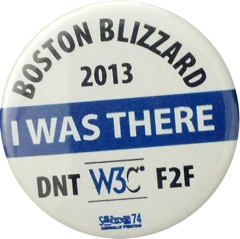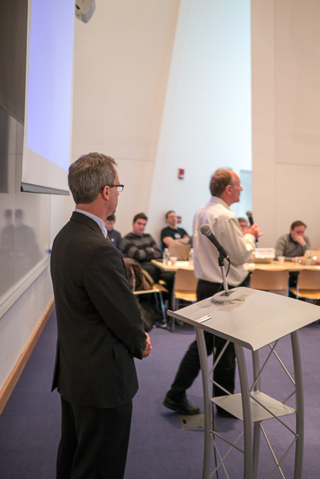Full Steam On Do Not Track

A blizzard of activity: that’s what we had at the Boston face-to-face of the Tracking Protection Working Group. Over the past two days, the group has successfully managed to identify a path toward fulfilling our W3C charter: we now have a roadmap to Last Call for a Do Not Track standard.
The face-to-face represented a new phase in activity on the Do Not Track compliance spec. After more than fifty stakeholder meetings over the past ninety days, and group sit-downs in D.C., Brussels and elsewhere, I’ve developed a fair sense of the goals and concerns of the unusually diverse set of people involved in our Do Not Track working group.
We outlined the four criteria for a successful DNT standard:
- Create a standard through the W3C.
- The standard should be consistent with the group’s charter.
- The standard should make a significant change from the status quo before our DNT work.
- We have to be able to explain clearly why a user choice of DNT reduces tracking for participating web sites.
This is our mission, together with a fifth goal – adopting the standard itself once it is written.

Our charter gives clear instructions to our Working Group, and it’s our job to follow them. When finished, the DNT standard will create a “simple machine-readable preference expression mechanism ("Do Not Track") and technologies for selectively allowing or blocking tracking elements.” The charter tells us to create a technical specification (chaired by Matthias Schunter) and a compliance specification, work that I now chair. The compliance spec “sets out practices for Web sites to comply with this [DNT] preference.”
Now that we have identified as a group all of the moving pieces involved in developing a DNT standard, our work shifts to the point-by-point resolution of issues that will lead us to actual spec language. We will define each task, have members of the group take ownership for drafting text, and resolutely march through the issues each week from here out.
Many of us will meet in Berlin in mid-March for a meeting of the “Global Considerations Task Force,” focused on international aspects of the standard. From there we will push towards a next face-to-face relatively soon, perhaps in April, on the main compliance spec. Building on real work on the text for each issue, we will push for a Last Call by summer, when the broader public is invited to comment.
All of this will require hard work from many parties, but we are now on a path to devising a workable, meaningful standard.
Comments (0)
Comments for this post are closed.